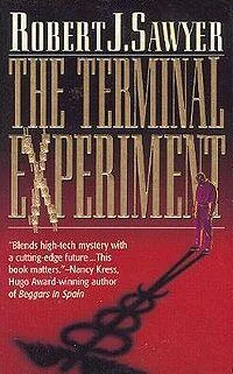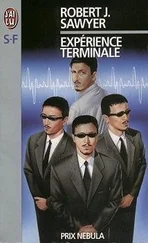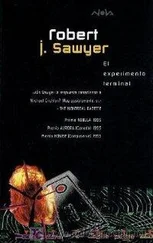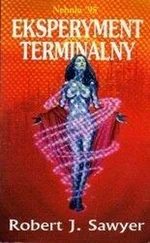“Well,” observed Pseudo as Peter departed, “I guess even the rich and famous have to take a leak now and then.”
Peter bristled as he made his way to the stairwell and walked down to the little basement that contained the two restrooms and a couple of pay phones. He didn’t really have to go, but he needed a little peace and quiet, a little time to get his bearings. It was like they were all mocking him. It was like they all knew.
Of course they knew. Peter had heard enough of Hans’s bragging in the past. Christ, they all probably knew about every one of Hans’s conquests.
He leaned against a wall. A Molson’s bimbo smiled at him from a poster. It had been a mistake coming here.
But wait — if Cathy’s coworkers knew, they’d probably known for months. It was ages since she and Hans had first done it. Peter tried to think back to the last time he’d been here, and the time before that. Had there been any indication that they knew? Were they really behaving differently tonight?
He couldn’t tell. Everything seemed different now. Everything.
He’d be humiliated if they knew. His private life invaded. On public view.
Humiliated. Degraded.
Christ, Hobson, can’t keep a woman, eh?
God damn it.
Life had been so simple before.
This had been a mistake.
He headed back to the table.
He would endure it for another hour. He looked at his watch. Yes. Sixty minutes. He could take that.
Maybe.
Peter and Cathy walked wordlessly up to the door of their house. Peter touched his thumb to the FILE scanner, and he heard the locking mechanism disengaging. He stepped through the door into the tile-covered entry area and paused to remove his outdoor shoes. Four and a half pairs of Cathy’s shoes were already lined up in front of the closet.
“Do you have to do that?” said Peter, pointing at them.
“I’m sorry,” said Cathy.
“I’d like to be able to come into my own home without tripping over your shoes all the time.”
“I’m sorry,” she said again.
“You’ve got a shoe rack in the bedroom.”
“I’ll move them there,” she said.
Peter placed his shoes on the mat. “You don’t see me piling up shoes out here.”
Cathy nodded.
Peter walked into the living room. “Computer — messages,” he called out.
“None,” said a synthesized voice.
He walked over to the couch, scooped up the remote, and sat down. He turned on the TV and began flipping channels, with the sound on MUTE.
“The pseudointellectual was in fine form tonight,” said Peter sarcastically.
“Jonas,” said Cathy. “His name is Jonas.”
“What the fuck do I care what his name is?”
Cathy sighed, and went to make herself some tea.
Peter knew he was being mean. He didn’t want to be this way. He’d been hoping tonight would go well, had been hoping that they could get on with their lives, with things the way they had always been.
But it wouldn’t work.
Tonight had proved that.
He couldn’t have anything to do with her coworkers ever again. Even without Hans there, the sight of those people reminded Peter of what she’d done — of what Hans had done.
Peter could hear the sounds of a spoon hitting china in the kitchen as Cathy stirred milk into her tea. “Aren’t you going to join me?” he called out.
She appeared in the doorway that led to the kitchen, her face impassive.
Peter put down the remote and looked at her. She was trying to be cooperative, trying to be brave. He didn’t want to be mean to her. He just wanted what they had had before.
“I’m sorry,” Peter said.
Cathy nodded, hurt but stalwart. “I know.”
Sarkar Muhammed’s artificial-intelligence company was called Mirror Image. Its offices were located in Concord, Ontario, north of Metro Toronto. Peter met Sarkar there on Saturday morning, and Sarkar took him upstairs to the newly created scanning room. It had originally been just a regular office. There were crushed indentations in the rug where filing cabinets had once been. There had also been a large window, but it had been completely covered with plywood panels to prevent light from coming in from outside, and the walls had been lined with gray foam rubber, molded in egg-carton shapes to deaden sound. In the center of the room was an old dentist’s chair on a swivel base and along one wall was a bench covered with a PC, various oscilloscopes, and several other pieces of equipment, including some circuitry breadboards lying out in the open.
Sarkar motioned for Peter to sit in the dentist’s chair.
“Just a little off the top,” said Peter.
Sarkar smiled. “We are going to take everything off the top — get a complete record of everything in your brain.” He positioned the scanner’s skullcap on Peter’s head.
“ L’chaim ,” said Peter.
Sarkar loosely fastened the cap’s chin strap and motioned for Peter to pull it tight. “Second down,” said Peter. “Four yards to go.”
Sarkar handed Peter two small earpieces. Peter inserted them. Finally, Sarkar handed him the test goggles: a pair of special glasses that projected separate video signals into each eye.
“Breathe through your nose,” said Sarkar. “And try to keep swallowing to a minimum. Also, try not to cough.”
Peter nodded.
“And don’t do that,” said Sarkar. “Don’t nod. I’ll assume you understand my instructions without your acknowledging them.” He moved to his workbench and pressed some keys on the PC. “In many ways, this is going to be more complex than what you did in recording the soulwave’s departure. There, you were simply looking for any electrical activity in the brain. But here, we must stimulate your brain in myriad ways, to activate every neural net contained within — most nets are inactive most of the time, of course.”
He pushed some more keys. “Okay, we’re recording now. Don’t worry if you have to shift to get comfortable in the next few minutes; it’ll take that long to calibrate, anyway.” He spent what seemed a very long time making minute adjustments to his controls. “Now, as we discussed,” said Sarkar, “you are going to receive a series of inputs. Some will be oral — spoken words or sounds on audiotape. Some will be visual: you will see images or words projected into your eyes. I know you speak French and a little Spanish; some of the inputs will be in those languages. Concentrate on the inputs, but don’t worry if your mind wanders. If I show you a tree and that makes you think of wood, and wood makes you think of paper, and paper makes you think of paper airplanes, and airplanes make you think of lousy food, that’s fine. Don’t force the connections, though: this is not an exercise in free association. We just want to map which neural nets exist in your brain, and what excites them. Ready? No — you nodded again. Okay, here we go.”
At first, Peter thought he was seeing a standard barrage of test images, but it soon became apparent that Sarkar had supplemented that with images specifically related to Peter. There were pictures of Peter’s parents, of the house he and Cathy lived in now and the one they’d lived in before it, shots of Sarkar’s cottage, Peter’s own high-school graduation photo, sound clips of Peter’s voice, and Cathy’s voice, and on and on, a This Is Your Life retrospective mingled with generic pictures of lakes and woods and football fields and simple mathematical equations and snatches of poetry and Star Trek trivia questions and popular music from when Peter had been a teenager and art and pornography and out-of-focus pictures that might have been Abe Lincoln or might have been a hound dog or might have been nothing at all.
Читать дальше








